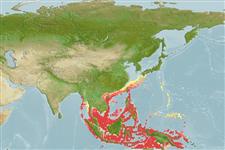>
Eupercaria/misc (Various families in series Eupercaria) >
Lutjanidae (Snappers) > Etelinae
Etymology: Pristipomoides: Greek, pristis = saw + Greek, poma, -atos = cover, operculum + Greek, oides = similar to (Ref. 45335).
More on author: Bleeker.
Environment: milieu / climate zone / depth range / distribution range
Οικολογία
Θαλασσινό(ά) βενθικό(ς); εύρος βάθους 40 - 120 m (Ref. 12260). Tropical; 32°N - 12°S, 93°E - 157°E (Ref. 55)
Eastern Indian Ocean: Andaman Sea. Western Pacific: New Guinea to Sumatra, north to the Ryukyu Islands. Present in Australia from the North West Shelf to Tweed Heads in New South Wales (Ref. 6390). Records from the western Indian Ocean need verification.
Length at first maturity / Μέγεθος / Βάρος / Age
Maturity: Lm ?, range 28 - ? cm
Max length : 70.0 cm TL αρσενικό/απροσδιόριστο; (Ref. 55); μεγ. δημοσιευμένο βάρος: 2.2 kg (Ref. 1451); μεγ. αναφερόμενη ηλικία: 11 έτη (Ref. 3090)
Ραχιαίες άκανθες (συνολικά): 10; Μαλακές ραχιαίες ακτίνες (συνολικά): 11-12; Εδρικές άκανθες 3; Μαλακές εδρικές ακτίνες: 8. Interorbital space flat. Bases of dorsal and anal fins without scales, their last soft rays extended into short filaments. Pectoral fins long, reaching level of anus. Scale rows on back parallel to lateral line. Overall color rosy red; the top of the head with longitudinal vermiculated lines and spots of brownish yellow; the dorsal fin with wavy yellow lines.
Sharptooth snappers are found in tropical and sub-tropical deep waters. They are found in schools and live in areas of hard, rocky and uneven sea floor (Ref. 27354). They feed on benthic invertebrates and fishes.
Studies in South China Sea (Ref. 28116) and Hawaii (Ref. 28117) suggest that this species is a serial spawner (Ref. 28115).
Allen, G.R., 1985. FAO Species Catalogue. Vol. 6. Snappers of the world. An annotated and illustrated catalogue of lutjanid species known to date. FAO Fish. Synop. 125(6):208 p. Rome: FAO. (Ref. 55)
IUCN Red List Status (Ref. 130435)
Threat to humans
Harmless
Human uses
αλιεία: περιορισμένης εμπορικότητας
Περισσότερες πληροφορίες
ΑναφορέςΥδατοκαλλιέργειεςΠροφίλ υδατοκαλλιέργειαςΣτελέχοιΓενετικήElectrophoresesΚληρονομικότηταΑσθένειεςΜεταποίησηNutrientsMass conversion
Εργαλεία
Special reports
Download XML
Διαδικτυακές πηγές
Estimates based on models
Preferred temperature (Ref.
123201): 23.4 - 28.2, mean 27.2 °C (based on 260 cells).
Phylogenetic diversity index (Ref.
82804): PD
50 = 0.5005 [Uniqueness, from 0.5 = low to 2.0 = high].
Bayesian length-weight: a=0.01175 (0.00693 - 0.01992), b=2.96 (2.82 - 3.10), in cm total length, based on LWR estimates for this species & Genus-body shape (Ref.
93245).
Τροφικό Επίπεδο (Ref.
69278): 4.2 ±0.61 se; based on food items.
Generation time: 4.3 ( na - na) years. Estimated as median ln(3)/K based on 2
growth studies.
Ελαστικότητα (Ref.
120179): Μεσαίο(α), ελάχιστος χρόνος για διπλασιασμό πληθυσμού 1,4 - 4,4 έτη (K=0.25; tmax=11; Fec=760,000).
Fishing Vulnerability (Ref.
59153): Moderate vulnerability (39 of 100).
Nutrients (Ref.
124155): Calcium = 85.3 [32.6, 191.8] mg/100g; Iron = 1.01 [0.55, 1.83] mg/100g; Protein = 18.3 [16.4, 19.9] %; Omega3 = 0.239 [0.141, 0.405] g/100g; Selenium = 64 [34, 134] μg/100g; VitaminA = 27.9 [8.6, 96.7] μg/100g; Zinc = 0.788 [0.521, 1.156] mg/100g (wet weight);
